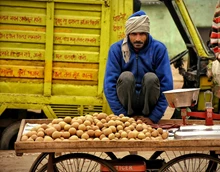
The country's drone infrastructure is "extremely robust," and an Indian case study of drones as a pioneer in agriculture will be displayed at the ongoing meeting of the G20 agriculture working group. He added that India's goal is to become a global hub for drones by 2030, for which an industry-friendly policy, such as the Production Linked Incentive Scheme (PLI), is in place.
The Union Minister told the media on the sidelines of the first G-20 Agriculture Deputies Meeting here: "Drones should not be viewed through narrow lines. The application of using drones as a service is extremely versatile and diverse."
Drones in agriculture should be used for more than just pesticide spraying. He claims that it can be used for cadastral mapping and agricultural land surveying. "The potential for drone use in jaivik kheti (organic farming) is also enormous. Drones have enormous potential for use even in natural farming "Scindia took note. He added that as organic farming grows, there will undoubtedly be an increase in the use of drones.
To reduce the use of chemical fertilizers and save Mother Earth, the government is heavily promoting organic and natural farming. Madhya Pradesh is currently at the forefront of organic farming. Drones in agriculture are currently only permitted for pesticide spraying. The Union minister stated that there are numerous applications for drones and that many more will emerge in the future. "I believe that as volume increases, so will versatility."
He stated that the prime minister has made it clear that India will no longer be a follower, but rather a leader in uncharted areas of the world. Drones are one such example. The government has taken a three-pronged approach to achieving the goal of becoming a global hub for drones by 2030, he said. To begin, the government has implemented a strong policy that has eliminated some burdensome rules and increased the ease of doing business.
In a short period of time, the country's drones were digitally mapped into red, green, and yellow zones. Second, the government has launched the PLI scheme to promote the drone industry. "For the first time, the PLI scheme was implemented for a fledgling industry," he explained. He added that the PLI scheme for the drone industry includes a nearly Rs 120 crore incentive for an industry whose size in 2021 was only Rs 60 crore. The minister also stated that the PLI scheme has produced "very good results," as many companies have registered and the industry has grown 6-8 times in the last year and a half.
Third, the government is creating demand for drones and has designated 12 ministries, including agriculture, to require the use of drone technology, he added. The first G20 Agriculture Deputies Meeting of the Agriculture Working Group (AWG) will conclude on February 15 after a three-day event.
It deliberated on four key priority areas: food security and nutrition, sustainable agriculture with a climate-smart approach, inclusive agriculture value chain and food supply system, and agriculture transformation digitization. The G20 agriculture working group's next meetings are expected to be held in Chandigarh, Varanasi, and Hyderabad.











